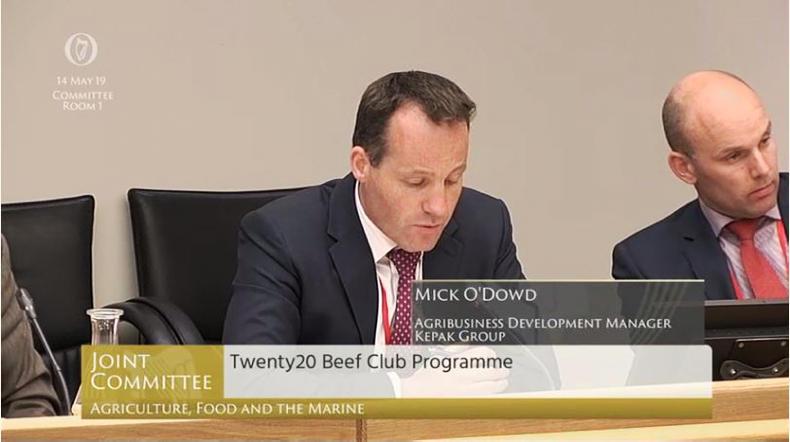The compulsory closed loop supply chain in the Glanbia-Kepak dairy calf to beef scheme is anti-competitive, members of the Oireachtas agriculture committee said on Tuesday.
Willie Penrose, Paul Daly and Michelle Mulherin said that they would ask the Competition Authority to investigate whether this is the case when it comes before the committee shortly.
"If you have other companies like merchants going out of business and ultimately you are the last ones standing why would you be benevolent to farmers? You are it would seem in a dominant position. I could well see how it would end badly," Michelle Mulherin said. "The farmers are at your mercy and that is the kernel of the concerns here."
These concerns were particularly directed at Glanbia which strongly refuted them.
"The closed loop to us is fundamental and is the genesis for us to be able pay over the market price," Martin Ryan from Glanbia said.
"It is easier to audit one supplier than 20 or 30. It forms a potential future opportunity to form a block chain for beef down the road and as we look to China that is definitely on their minds."
Fertiliser
He justified the inclusion of fertiliser in the closed loop on the system on the basis that farmers need to use the right kind of fertiliser to manage climate impact and this is what purchasers of beef from the Twenty20 club want.
"I can assure you we will have a competitive price proposition because without it it will never work for anybody," Ryan said.
The year one target of 6,000 calves has been oversubscribed already, according to Mick O'Dowd from Kepak. In year one, there will be 100 to 150 members.
The average number of cattle per farmer is in the region of 50 to 55. Membership of the club will rise to 1,000 by the time it hits the 50,000 calf target, O'Dowd said.
"We felt that coming together, investing in genetics and raising that standard will bring more predictability to the performance of the calf. If that is coupled with technical support that gives us predictability around the quality of our supply," he said.
"It is a solution, not the solution. This represents 50,000 animals after three or four years, which is less than 3% of the overall kill."
Read more
Merchants warn farmers about Glanbia prices
Farmers grill Glanbia and Kepak on new calf scheme
The compulsory closed loop supply chain in the Glanbia-Kepak dairy calf to beef scheme is anti-competitive, members of the Oireachtas agriculture committee said on Tuesday.
Willie Penrose, Paul Daly and Michelle Mulherin said that they would ask the Competition Authority to investigate whether this is the case when it comes before the committee shortly.
"If you have other companies like merchants going out of business and ultimately you are the last ones standing why would you be benevolent to farmers? You are it would seem in a dominant position. I could well see how it would end badly," Michelle Mulherin said. "The farmers are at your mercy and that is the kernel of the concerns here."
These concerns were particularly directed at Glanbia which strongly refuted them.
"The closed loop to us is fundamental and is the genesis for us to be able pay over the market price," Martin Ryan from Glanbia said.
"It is easier to audit one supplier than 20 or 30. It forms a potential future opportunity to form a block chain for beef down the road and as we look to China that is definitely on their minds."
Fertiliser
He justified the inclusion of fertiliser in the closed loop on the system on the basis that farmers need to use the right kind of fertiliser to manage climate impact and this is what purchasers of beef from the Twenty20 club want.
"I can assure you we will have a competitive price proposition because without it it will never work for anybody," Ryan said.
The year one target of 6,000 calves has been oversubscribed already, according to Mick O'Dowd from Kepak. In year one, there will be 100 to 150 members.
The average number of cattle per farmer is in the region of 50 to 55. Membership of the club will rise to 1,000 by the time it hits the 50,000 calf target, O'Dowd said.
"We felt that coming together, investing in genetics and raising that standard will bring more predictability to the performance of the calf. If that is coupled with technical support that gives us predictability around the quality of our supply," he said.
"It is a solution, not the solution. This represents 50,000 animals after three or four years, which is less than 3% of the overall kill."
Read more
Merchants warn farmers about Glanbia prices
Farmers grill Glanbia and Kepak on new calf scheme






 This is a subscriber-only article
This is a subscriber-only article












SHARING OPTIONS: